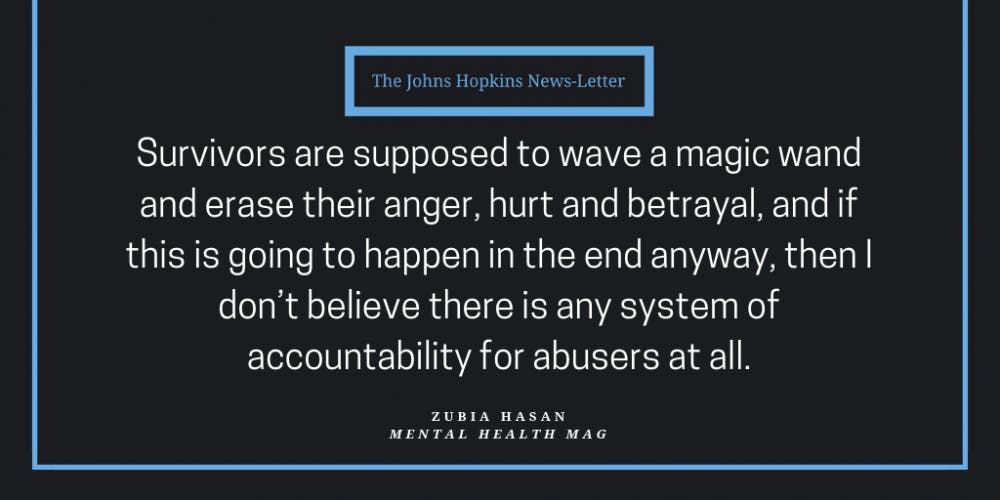Forgiveness is a complicated thing. It is touted as the one path to inner peace. Bitter people are never happy; angry people are never at peace. Accepting this was hard for me, because I am angry, and I am bitter, and I don’t think I want to let go of that. I think my anger is what drives me, and some may say that is no way to live your life, but I think it has been the only way to live mine.
I am a relatively religious person. I may not pray so much, but I have a stubborn belief in God. And so it follows that I have a strong belief in justice. And be it the Bible or the Quran or the Torah or any other scripture that I am faintly acquainted with, forgiveness is touted as one of the qualities of God and thus one of the qualities that we as humans should aspire to.
And so being the relatively religious person I am, it didn’t seem like my choice of emotion was one particularly pleasing to God. But this didn’t bother me so much — I don’t think my god is so petty — but for those people who wanted to police my path to healing, the God excuse became a legitimate way of downplaying my anger. And that’s why today I want to talk about why it’s OK to not forgive others for wronging you.
It’s funny how forgiveness has almost become the destination for all journeys to healing. It’s become commercialized and exploited to the extent that forgiveness loses its true meaning. It becomes a cover for abusers. Because if forgiveness is the end of all paths to healing then the act of abuse doesn’t really matter.
Survivors are supposed to wave a magic wand and erase their anger, hurt and betrayal, and if this is going to happen in the end anyway, then I don’t believe there is any system of accountability for abusers at all.
There is also the matter of what forgiveness is supposed to look like. I’ve heard from people about how there is this magical moment, this life-defining epiphany where I suddenly realize I can rise above the abuse and from then on I’m a changed person, a healed person.
That can’t be further from the truth.
Forgiveness is not this blanket statement; it’s not this umbrella that can hover above your life and protect you from all sorts of rain forever. It isn’t this yogi-like moment; it’s not a moment at all. It’s a constantly evolving, backtracking, sometimes changing thing.
There are times when I look back at my emotionally abusive relationship and I can forgive my ex because I feel sorry for him — how broken do you have to be to do that to another person? But there are other times — more times — when I am angry and rightfully angry.
Let’s get one thing straight: Forgiveness is a privilege, and those who want it have to earn it.
It’s sad that we as women are always expected to rise above. In a way, archaic beliefs about women compromising in relationships is a sugar-coated way of telling them to suffer. And women in abusive relationships are expected to suffer and forgive again and again — in return they are lauded by society as being better people.
Why does forgiveness make you a better person? Why does my rage make me a lesser person? This is the same idea that puts women on a moral pedestal that only serves to trap them. I’m tired of fighting for my right to be angry. I’m tired of fighting for my right to be a person. I’m not going to forgive because I don’t want to forgive. And that in itself should have been enough justification.
Wagatwe Wanjuki, a feminist activist and a survivor herself, talked about how there’s no need for her to forgive someone who isn’t even asking for her forgiveness, and I agree. Forgiveness is rare: It’s not something to be handed out to every which person. And it is also a choice which should be respected.
As for those who cite examples of God forgiving his people, there is only one caveat to that: He forgives those who repent with sincerity. My abusers have not — and even if they did I don’t have any obligation to forgive them.
For those who have truly forgiven their abusers, I am proud and happy for all of you. But for those who just can’t, don’t worry. There’s more where that came from.





